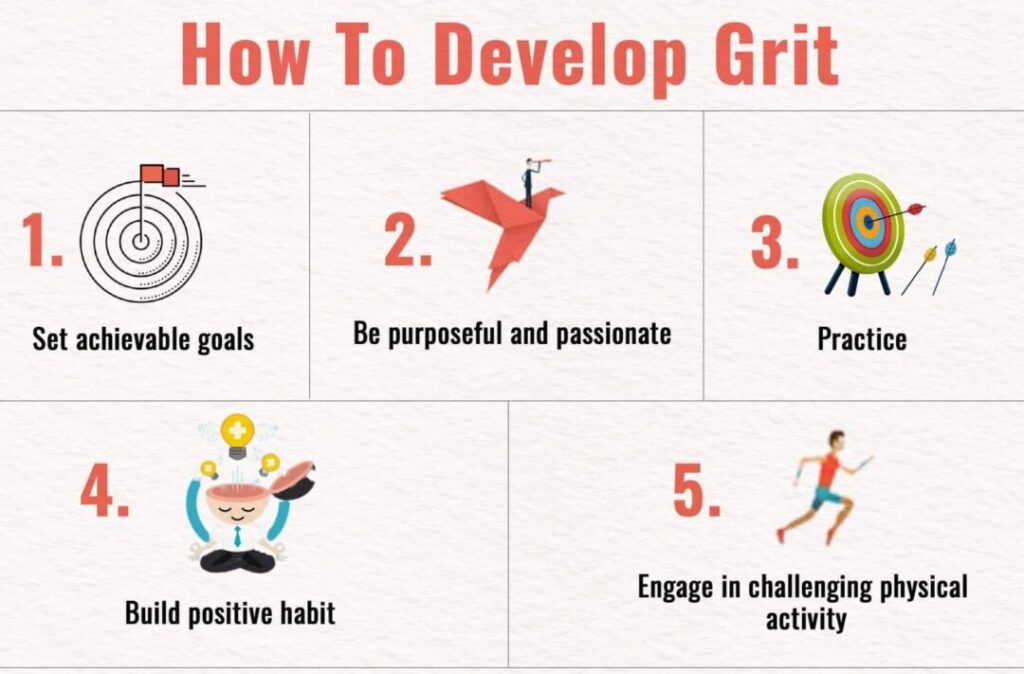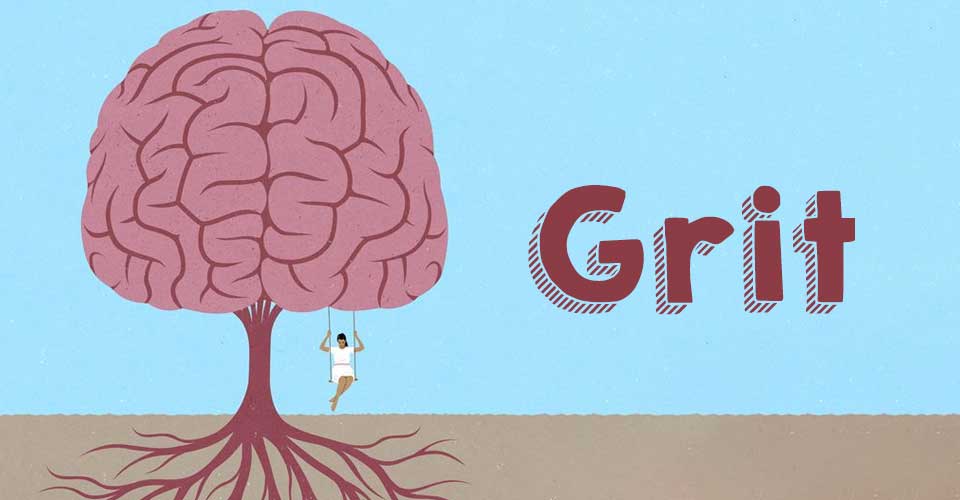Grit is a personality trait that is associated with passion, ambition, resilience, and perseverance that helps us to accomplish long-term goals. To put it simply, it is the passionate pursuit of long-term objectives.
What Is Grit?
It is a positive personality trait marked by a person’s motivation, passion and perseverance for reaching a specific long-term resolution, goal or the final state after it’s successful completion. It is an aspect of our mental toughness. Constant effort & hard work under challenging circumstances, maintenance of passion, interest and perseverance of effort to achieve a target is the primary essence of this mental construct.
Grit enables us to pursue our goals despite repeated obstacles, failures and hardships. According to psychologist 1 Angela Duckworth Eskreis-Winkler, L., Shulman, E. P., Beal, S. A., & Duckworth, A. L. (2014). The grit effect: predicting retention in the military, the workplace, school and marriage. Frontiers in psychology, 5, 36. https://doi.org/10.3389/fpsyg.2014.00036 , who coined the term & developed the Short Grit Scale (Grit-S 2 Duckworth, A. L., & Quinn, P. D. (2009). Development and validation of the short grit scale (grit-s). Journal of personality assessment, 91(2), 166–174. https://doi.org/10.1080/00223890802634290 ), it is a prerequisite for success and a predictor of our ability to accomplish our goals in the long run. In a 2007 study 3 Duckworth, A. L., Peterson, C., Matthews, M. D., & Kelly, D. R. (2007). Grit: perseverance and passion for long-term goals. Journal of personality and social psychology, 92(6), 1087–1101. https://doi.org/10.1037/0022-3514.92.6.1087 , she explained “Defined as perseverance and passion for long-term goals, grit accounted for an average of 4% of the variance in success outcomes,” in a sample study.
This non-cognitive trait helps us to complete and achieve complex and difficult tasks even when we are tempted to quit. Studies 4 Robertson-Kraft, C., & Duckworth, A. L. (2014). True Grit: Trait-level Perseverance and Passion for Long-term Goals Predicts Effectiveness and Retention among Novice Teachers. Teachers College record (1970), 116(3), https://www.tcrecord.org/Content.asp?ContentId=17352. have found that grittier individuals perform better than people who are less gritty, and are hence, less likely to give up mid-way. It is related to the psychological concepts of conscientiousness, resilience 5 Alahdab, F., Halvorsen, A. J., Mandrekar, J. N., Vaa, B. E., Montori, V. M., West, C. P., Murad, M. H., & Beckman, T. J. (2020). How do we assess resilience and grit among internal medicine residents at the Mayo Clinic? A longitudinal validity study including correlations with medical knowledge, professionalism and clinical performance. BMJ open, 10(12), e040699. https://doi.org/10.1136/bmjopen-2020-040699 , aspiration, hardiness and perseverance, although each construct is distinct and unique. People with high levels of grit do not get demotivated or distracted from their objectives, despite a lack of positive feedback. It can help to “predict an individual’s achievement in challenging domains over and beyond measures of talent,” explains a recent 2020 study 6 Luo, J., Wang, M. C., Ge, Y., Chen, W., & Xu, S. (2020). Longitudinal Invariance Analysis of the Short Grit Scale in Chinese Young Adults. Frontiers in psychology, 11, 466. https://doi.org/10.3389/fpsyg.2020.00466 .
Read More About Conscientiousness Here
Understanding Grit
A gritty person is typically mentally tough, tenacious and ambitious. They put in the same level of sustained effort driven by passion, interest, endurance, resilience and motivation over time to become successful in their preferred field. It makes us work hard and invest in strenuous practice in order to win. Research 7 Hodges, N. J., Ford, P. R., Hendry, D. T., & Williams, A. M. (2017). Getting gritty about practice and success: Motivational characteristics of great performers. Progress in brain research, 232, 167–173. https://doi.org/10.1016/bs.pbr.2017.02.003 shows that grit is “a defining characteristic” in the most successful and elite athletes as it enables them to persevere through challenges and experience increased motivation after setbacks.
Being passionate about something and persevering to achieve a goal against all odds are the main components of this construct. Although some people may be persevering, they tend to lack the necessary passion or interest for the goal. As a result, over time they become tired and give up. But being gritty means you relently pursue your goals, learn from your mistakes, adapt to challenges and enjoy the process of reaching the end state.
According to a 2014 research paper 8 Von Culin, K. R., Tsukayama, E., & Duckworth, A. L. (2014). Unpacking grit: Motivational correlates of perseverance and passion for long-term goals. The journal of positive psychology, 9(4), 306–312. https://doi.org/10.1080/17439760.2014.898320 , this personality trait is considered as a character strength and it’s two primary elements include –
- Consistency of interests
- Perseverance of effort
The researchers added “pursuing engagement was more strongly associated with perseverance of effort, whereas pursuing pleasure was more strongly (inversely) associated with consistency of interests over time.” Another 2018 study found that people with high levels of this personality trait had higher probabilities of developing a growth oriented mindset 9 Sigmundsson, H., Haga, M., & Hermundsdottir, F. (2020). Passion, grit and mindset in young adults: Exploring the relationship and gender differences. New Ideas in Psychology, 59, 100795. https://doi.org/10.1016/j.newideapsych.2020.100795 , being more resilient, having stronger self control and better overall mental wellbeing. It is also associated with perceived stress and makes people “less prone to stress.” The study also found that grit tends to vary with age and gender. Women tend to be grittier than men, as per research 10 Ma, Y., Ma, C., & Lan, X. (2020). Uncovering the Moderating Role of Grit and Gender in the Association between Teacher Autonomy Support and Social Competence among Chinese Undergraduate Students. International journal of environmental research and public health, 17(17), 6398. https://doi.org/10.3390/ijerph17176398 .
Moreover, the following themes were observed by the researchers –
- Passion & perseverance of effort are related to endurance, dedication, resilience and short & long term goals
- Self-control is closely associated with this positive trait and involves self-awareness, understanding self strengths & weaknesses, prioritizing tasks and time management
- Positive mindset helps to develop a positive attitude towards constructive criticism, learning and non-materialistic achievements.
Read More About Resilience Here
Why Grit Is Important
This intrapersonal strength plays a vital role in our lives. “Angela Duckworth’s 2013 TED talk introduced grit to a broad audience and described it as an important predictor of future success” and achievement, explains a 2018 study 11 Jachimowicz, J. M., Wihler, A., Bailey, E. R., & Galinsky, A. D. (2018). Why grit requires perseverance and passion to positively predict performance. Proceedings of the National Academy of Sciences of the United States of America, 115(40), 9980–9985. https://doi.org/10.1073/pnas.1803561115 . This personality trait enables us to be successful regardless of our level of intelligence and talent.
Although natural talent can significantly contribute to being successful, having passion and perseverance of effort can empower us to reach our goals and thrive in the long run. Grit enables us to reach our fullest potential, while without it our talent can easily get lost. This trait transforms talent into a valuable asset through effort that leads to success.
Being gritty gives us the mental strength to walk that extra mile. Talent and intelligence can only be helpful in your quest for success when you have the mindset to overcome failures and struggles consistently over a period of time. Moreover, this trait also helps us develop self-control, which is an “important determinant 12 Duckworth, A., & Gross, J. J. (2014). Self-Control and Grit: Related but Separable Determinants of Success. Current directions in psychological science, 23(5), 319–325. https://doi.org/10.1177/0963721414541462 of success.” It allows us to regulate our behavior, emotions and attention when distractions tempt us to go astray. One study states that “grittier individuals were less likely to drop out of their respective life commitments.”
It was found that being gritty can help with retention and success in high school 13 Flanagan, K. M., & Einarson, J. (2017). Gender, Math Confidence, and Grit: Relationships with Quantitative Skills and Performance in an Undergraduate Biology Course. CBE life sciences education, 16(3), ar47. https://doi.org/10.1187/cbe.16-08-0253 , workplace, the military and marital relationships. Research 14 Sharkey, C. M., Bakula, D. M., Gamwell, K. L., Mullins, A. J., Chaney, J. M., & Mullins, L. L. (2017). The Role of Grit in College Student Health Care Management Skills and Health-Related Quality of Life. Journal of pediatric psychology, 42(9), 952–961. https://doi.org/10.1093/jpepsy/jsx073 also shows that it is strongly and positively associated with health-related quality of life, especially in adolescents and young adults. “Higher levels of grit were linked to better health care management skills and better mental and physical HRQoL (health-related quality of life),” explains a 2019 study 15 Traino, K. A., Bakula, D. M., Sharkey, C. M., Roberts, C. M., Ruppe, N. M., Chaney, J. M., & Mullins, L. L. (2019). The Role of Grit in Health Care Management Skills and Health-related Quality of Life in College Students with Chronic Medical Conditions. Journal of pediatric nursing, 46, 72–77. https://doi.org/10.1016/j.pedn.2019.02.035 . Hence, the importance of this effortful persistence is evident not just for success, but also for health and satisfaction in life.
How To Develop Grit

One 2019 study 16 Lechner, C. M., Danner, D., & Rammstedt, B. (2019). Grit (effortful persistence) can be measured with a short scale, shows little variation across socio-demographic subgroups, and is associated with career success and career engagement. PloS one, 14(11), e0224814. https://doi.org/10.1371/journal.pone.0224814 revealed that this personality trait “denotes the disposition to pursue long-term goals with sustained effort, zeal, and interest over time, or in short: effortful persistence.” Although some people are inherently grittier, most of us may lack true grit in the face of failure and obstacles. However, there are some strategies we can use to develop effortful persistence and become grittier and more successful in life. Here are some helpful ways that can help you develop grit –
1. Be purposeful and passionate
Perseverance of effort is driven by your sense of purpose which makes us passionate about the goal you are pursuing in the long haul. Gritty individuals feel that their objective is meaningful which leads to effortful persistence. Purpose directly contributes to making us interested and motivated in pursuing our goals despite challenges. “Having a purpose in life entails having a clear long-term direction toward which to strive, that organizes one’s behaviors and sense of self,” states a 2016 study 17 Hill, P. L., Turiano, N. A., Mroczek, D. K., & Burrow, A. L. (2016). The Value of a Purposeful Life: Sense of Purpose Predicts Greater Income and Net Worth. Journal of research in personality, 65, 38–42. https://doi.org/10.1016/j.jrp.2016.07.003 . When we are passionate about our purpose, we develop grit.
2. Practice, practice, practice
Purpose, perseverance and passion helps us practice repeatedly even if we don’t see results initially, but only through consistent practice can we develop the skills to be successful. Intentional, deliberate and constant practice helps to develop perseverance. This empowers us to learn from our mistakes and improve through feedback. Studies 18 Ericsson, K. A., & Harwell, K. W. (2019). Deliberate Practice and Proposed Limits on the Effects of Practice on the Acquisition of Expert Performance: Why the Original Definition Matters and Recommendations for Future Research. Frontiers in psychology, 10, 2396. https://doi.org/10.3389/fpsyg.2019.02396 show that deliberate and structured practice strongly influences our performances and outcomes. The study adds that “deliberate practice is important” as it explained 26% of the variance in performance for games, 21% for music and 18% for sports. Being committed and dedicated to practice helps to develop grit as a habit.
3. Build positive habits
Although motivation is crucial for being resilient and mentally tough, building habits matter more than motivation, when it comes to developing grit. Cultivating strong habits through daily practice and effort makes you follow a strict schedule or routine 19 Arlinghaus, K. R., & Johnston, C. A. (2018). The Importance of Creating Habits and Routine. American journal of lifestyle medicine, 13(2), 142–144. https://doi.org/10.1177/1559827618818044 even when you don’t want to. Habit makes us perform through daily practice rather than relying on inspiration. Developing habits empower us to be more consistent in our performance without depending on talent or intelligence. Habits help you become gritty and do things you’re supposed to do. Research 20 Kohyama J. (2016). Good daily habits during the early stages of life determine success throughout life. Sleep science (Sao Paulo, Brazil), 9(3), 153–157. https://doi.org/10.1016/j.slsci.2016.09.002 shows that daily good habits help to determine success throughout life.
Read More About How To Form Effective Habits Here
4. Set achievable goals
Having realistic goals that can be achieved through effort and dedication is crucial for developing this mental construct. When you work hard consistently towards achieving the same objectives over time, you gain mastery over your skills. The harder you work, the stronger your self-confidence will get. Your goals will also add meaning and purpose to your efforts and help you persevere in the right direction.
Research 21 Berg J. L. (2015). The role of personal purpose and personal goals in symbiotic visions. Frontiers in psychology, 6, 443. https://doi.org/10.3389/fpsyg.2015.00443 shows that personal goals are related to personal purpose. According to one 2019 study 22 Bailey R. R. (2017). Goal Setting and Action Planning for Health Behavior Change. American journal of lifestyle medicine, 13(6), 615–618. https://doi.org/10.1177/1559827617729634 , goal setting can help you recognize what behaviors you need to change and how you can do so. “Goals are mental representations of desired outcomes, and goal setting is the process by which one identifies specific goals and determines how they will be achieved,” adds the study.
5. Engage in challenging physical activity
Grit is like any other muscle; the more you work on it, the stronger it will become. Being mentally tough or having effortful persistence is not just about achieving goals or overcoming major challenges, it is also about going and growing through everyday hurdles and obstacles. Performing strenuous physical activity or exercise, depending on your level of stamina, strength and endurance on a daily basis, can help you become grittier. Studies 23 Rutberg, S., Nyberg, L., Castelli, D., & Lindqvist, A. K. (2020). Grit as Perseverance in Physical Activity Participation. International journal of environmental research and public health, 17(3), 807. https://doi.org/10.3390/ijerph17030807 have found that grit is associated with physical activity. One recent 2020 study 24 Stamatis, A., Grandjean, P., Morgan, G., Padgett, R. N., Cowden, R., & Koutakis, P. (2020). Developing and training mental toughness in sport: a systematic review and meta-analysis of observational studies and pre-test and post-test experiments. BMJ open sport & exercise medicine, 6(1), e000747. https://doi.org/10.1136/bmjsem-2020-000747 explains “Mental toughness (MT) has been linked to a variety of desirable behaviours (eg, perseverance) and favorable sport performance outcomes (eg, achievement).”
Here are some other strategies that can help someone become more grittier in life –
- Take small steps every day towards achieving your goals
- Learn to control your emotions in stressful situations by developing emotion regulation skills
- Take steps to get out of your comfort zone more often
- Be intentional about building more positive connections with others by socializing frequently
- Develop a more flexible & adaptive mindset and be more open towards changes, feedback and experiences in life
- Avoid being lazy or procrastinating
- Be more proactive about making decisions when facing challenges
- Invest your time deliberately, trust the process and have patience as success takes time
- Hone your strengths and work on your weaknesses
- Have faith in your skills and yourself. Avoid self-criticism, self-doubt and negative self-talk
- Focus on the bigger picture and plan your moves accordingly
- Acknowledge failures, learn from mistakes and celebrate small wins
- Develop skills for coping with stress, anxiety and frustration
- Learn to rest when you feel tired instead of thinking about quitting
- Develop a more positive mindset. Be more optimistic & hopeful in your daily life
- Spend more time with people you think are mentally tough and grittier than you
- Practice self-love, self-care and self-compassion
Grit Is The Key To Success
Talent, intelligence, opportunities or luck cannot guarantee success. But being gritty in life can significantly increase your chances of reaching your goals. It is a crucial personal asset that drives you towards achieving your objectives and being happy in life. It helps you value failures, avoid giving up on your dreams and pushes you forward despite hardships.
Grit At A Glance
- Grit is a non-cognitive, personality trait & a mental construct. It is a predictor of future success.
- Passion and perseverance of effort for achieving long-term goals against all odds are its main components.
- It is associated with but distinct from conscientiousness, resilience, aspiration, hardiness, self-control, interest, endurance, and motivation.
- Gritty individuals tend to be mentally tough, tenacious, and ambitious in life.
- Grit helps to develop a growth-oriented mindset, better self-control, mental well-being, and quality of life.
- It varies with age and gender. Studies show that women are grittier than men.
- Grit can be developed and strengthened with some self-help strategies.













